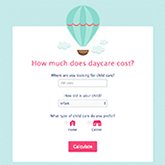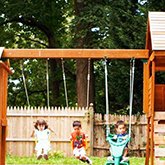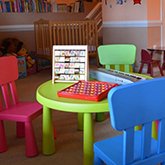
About Cooperative Preschools Near Me
A co-op preschool can follow any one of the many preschool philosophies such as Montessori, play-based, Reggio Emilia, or Waldorf. The main difference between a cooperative preschool and a regular one is that the board of directors is run by the preschoolers' parents, who oversee hiring teachers, setting the preschool curriculum, buying supplies, and so forth. Parents in a co-op daycare or preschool are expected to help in the classroom, anywhere from once a month to once a week or more. They might also be asked to serve on a committee and help with fundraisers. Because of the high level of parental involvement, the cost of co-op preschools or daycares is typically lower, without sacrificing the quality of care and early learning.
While it is possible for parents to be involved when their child starts daycare for any kind of program, the cooperative approach allows an unmatched level of involvement in their children's early childhood education. However, these types of child care and preschool programs can be very time-consuming for working parents. Therefore, since cooperative daycares and preschools follow whatever teaching philosophy is agreed upon by the board, the most important question for prospective parents will be whether they are able to meet the level of commitment that is required. It might be a perfect fit, but if both parents work full-time, it may be difficult to meet the demands of a co-op child care program.
If at least one parent can commit to being involved, a cooperative daycare can be a great option, especially for families with young children. The strong parental presence will provide a more nurturing environment than in many non-cooperative child care programs. This is a perfect option for parents who want a more direct impact on their child's early education since everything from enrollment numbers, to classroom layout, and curriculum will be defined by the board of (parent) directors. Children will have more consistency in a co-op preschool and the sense of community is often very strong.
On the other hand, children who are prone to separation anxiety might have a better learning experience when their parents are not in the classroom. It also could be difficult for some children to see their parents giving a lot of attention to other kids. Finally, it's worth considering that parents will naturally have some disagreements when it comes to the best way to educate young children, and differing opinions will clash more often in a cooperative setting. Nevertheless, for those with the ability and willingness to take on the responsibility, participating in a co-op preschool or child care center can be a rewarding experience for both parent and child.
Other Cooperative Preschools Near Me
Recent Reviews for Cooperative Preschools
Ma’s Daycare, Silver Spring
"Maria has truly been an angel sent from heaven. From day one, my experience with her childcare has been nothing short of exceptional. My kids absolutely adore her, which says so"
Read More
New Hampshire Estates Playhouse, Silver Spring
"My child has gone to this childcare facility for drop-in care as needed when our normal childcare is closed. The provider is extremely capable and kind. She’s great with children"
Read More
People who searched for "Cooperative Preschools" also viewed
Frequently Asked Questions
How many cooperative daycares and preschools are there in the US?
There are 1,319 cooperative daycares and preschools in the US, based on CareLuLu data. This includes 179 home-based programs and 1,140 centers.
How much do cooperative daycares and preschools cost in the US?
The average cost of cooperative daycares and preschools in the US is $798 per month. This is the average price for full-time, based on CareLuLu data.
How many cooperative daycares and preschools offer infant care in the US?
Based on CareLuLu data, 320 cooperative daycares and preschools care for infants (as well as toddlers).
How many cooperative daycares and preschools offer part-time care or drop-in care in the US?
Based on CareLuLu data, 666 cooperative daycares and preschools offer part-time care or drop-in care in the US.
How many cooperative daycares and preschools teach a foreign language in the US (Spanish, French, Chinese, etc.)?
Based on CareLuLu data, 285 cooperative daycares and preschools speak at least one foreign language. Most common languages include Spanish, French, Hindi, Chinese and Arabic.
Top Resources Related to Daycares

How Much Does Daycare Cost? Check the Daycare Price Calculator
How much does full time daycare near me cost? Is home daycare more affordable than a center?
How much does full time daycare cost? Is home daycare near me more affordable than a center? Use our Daycare Tuition Calculator to find out average daycare tuition rates in your zip code.
See More
Child Care Center vs. Home-Daycare: Pros & Cons
Which environment is better, a child care center or a home-based daycare? The answer is simple...
During a child care seminar for parents and parents-to-be, I realized the differences between child care centers and home-based daycares were unclear to a lot of families. I was asked which environment was the best, center or home. My answer was simple...
See More
Preschool Teaching Philosophies in a Nutshell
Montessori, Waldorf, Reggio Emilia, High-Scope... which preschool teaching philosophy is the best?
Montessori, Waldorf, Reggio Emilia, High-Scope, Bank Street... Most likely you've never come across such terms, unless of course... you started looking for a preschool! Which preschool teaching philosophy is the best? Find out how they are different.
See More
Switching Daycares: 7 Tips for a Smooth Transition
Thinking of switching daycares? These 7 practical, expert-backed tips will help you prepare your child emotionally and make the change as smooth as possible.
Thinking of switching daycares? These 7 practical, expert-backed tips will help you prepare your child emotionally and make the change as smooth as possible.
See More
How To Get Your Child Care Tax Credit
Here are 10 things you need to know to claim your Child and Dependent Care Credit...
For most families, child care is the highest single household expense. But, there's good news! Uncle Sam is here to help and can offset some of your daycare costs. Here are 10 things you need to know to claim your Child and Dependent Care Credit...
See More
7 Gift Ideas for Child Care Provider Appreciation Day
Are you looking for gift ideas for Child Care Provider Appreciation Day? We've got 7 memorable suggestions to celebrate the ones who care for your little ones.
Are you looking for gift ideas for Child Care Provider Appreciation Day? We've got 7 memorable suggestions to celebrate the ones who care for your little ones.
See More
What to Look for During a Child Care & Preschool Tour
Make the most of your daycare tour, here's how to evaluate the program before your child enrolls.
The daycare and preschool tour is a (maybe even the) key moment in the decision making process, so it's important that you make the most of your daycare tour. Here's how to evaluate the child care program before your child enrolls.
See More
10 Tips for Finding Great Child Care
Here are 10 tips to help you find affordable and quality child care.
When I needed a daycare and a preschool for my girls, I spent days on Google, phone, and visiting in person. I toured 16 centers before settling for the one that felt right for us. Here are 10 tips to help you find quality child care more easily.
See More
How to Get Your Child to Share Their Day at Daycare & Preschool
"How was your day?" you ask your preschooler. If you're lucky, you'll get "Good." Here's why...
"How was your day?" you ask your preschooler. If you're lucky, you'll get "Good." "Why doesn't my little one tell me about her day?" you wonder. This is a parenting conundrum that baffles many. There are a few possible reasons...
See More
How to Find the Best Daycare for You
In this post, we'll walk you through how to find a daycare and criteria to help you narrow down options.
There are many things to consider when searching for the best daycare for your family, which can understandably leave you feeling overwhelmed. In this post, we'll walk you through how to find a daycare and criteria to help you narrow down options.
See More















